Leadership Styles and Behaviours of Jeff Bezos: A Case Study
VerifiedAdded on 2023/06/15
|18
|4678
|326
AI Summary
This report covers the leadership styles, behaviours and impact of leader’s behaviour over organizational performance of Jeff Bezos, the CEO of Amazon Inc. It includes theories and models of leadership, feedback from Jeff Bezos, and self-reflection on leadership qualities.
Contribute Materials
Your contribution can guide someone’s learning journey. Share your
documents today.
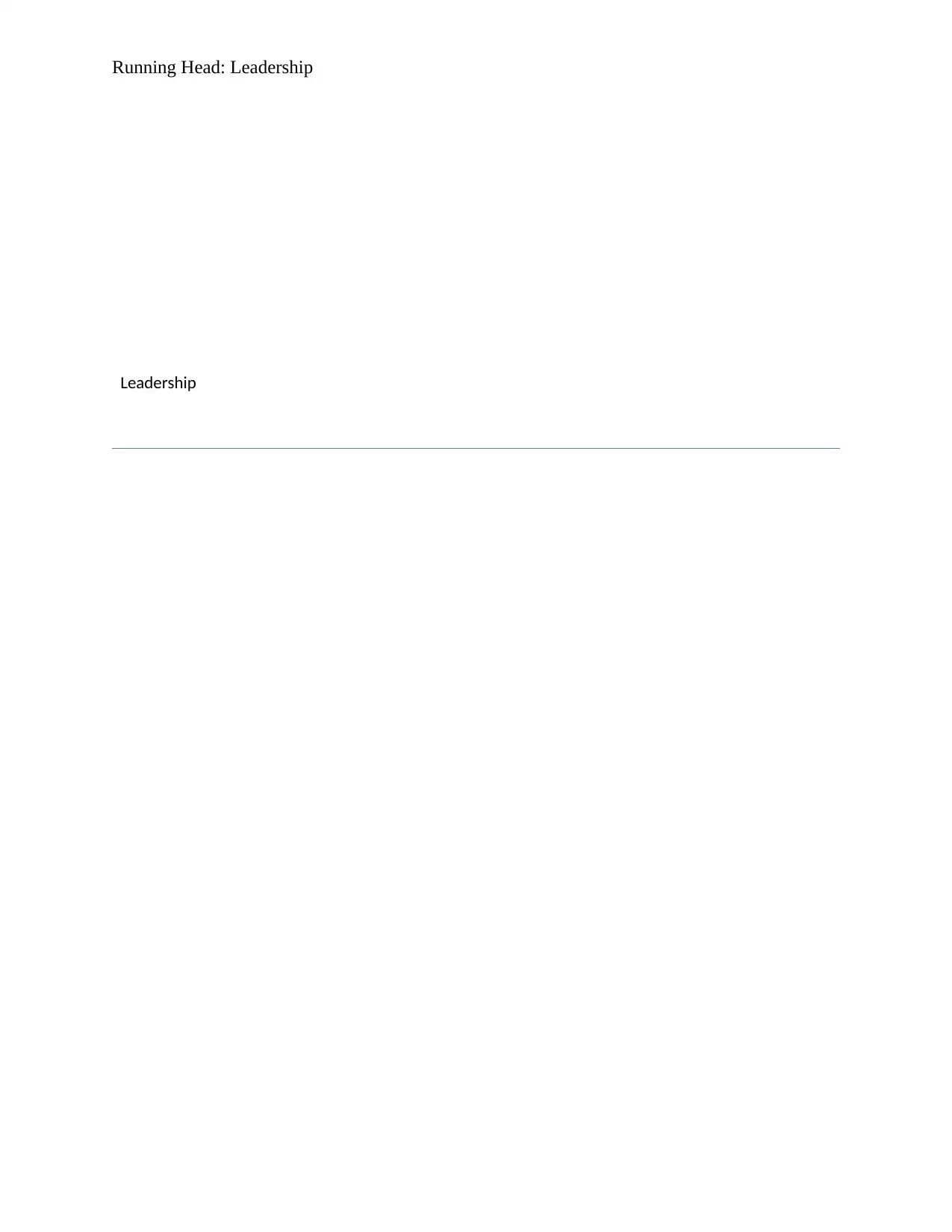
Running Head: Leadership
Leadership
Leadership
Secure Best Marks with AI Grader
Need help grading? Try our AI Grader for instant feedback on your assignments.
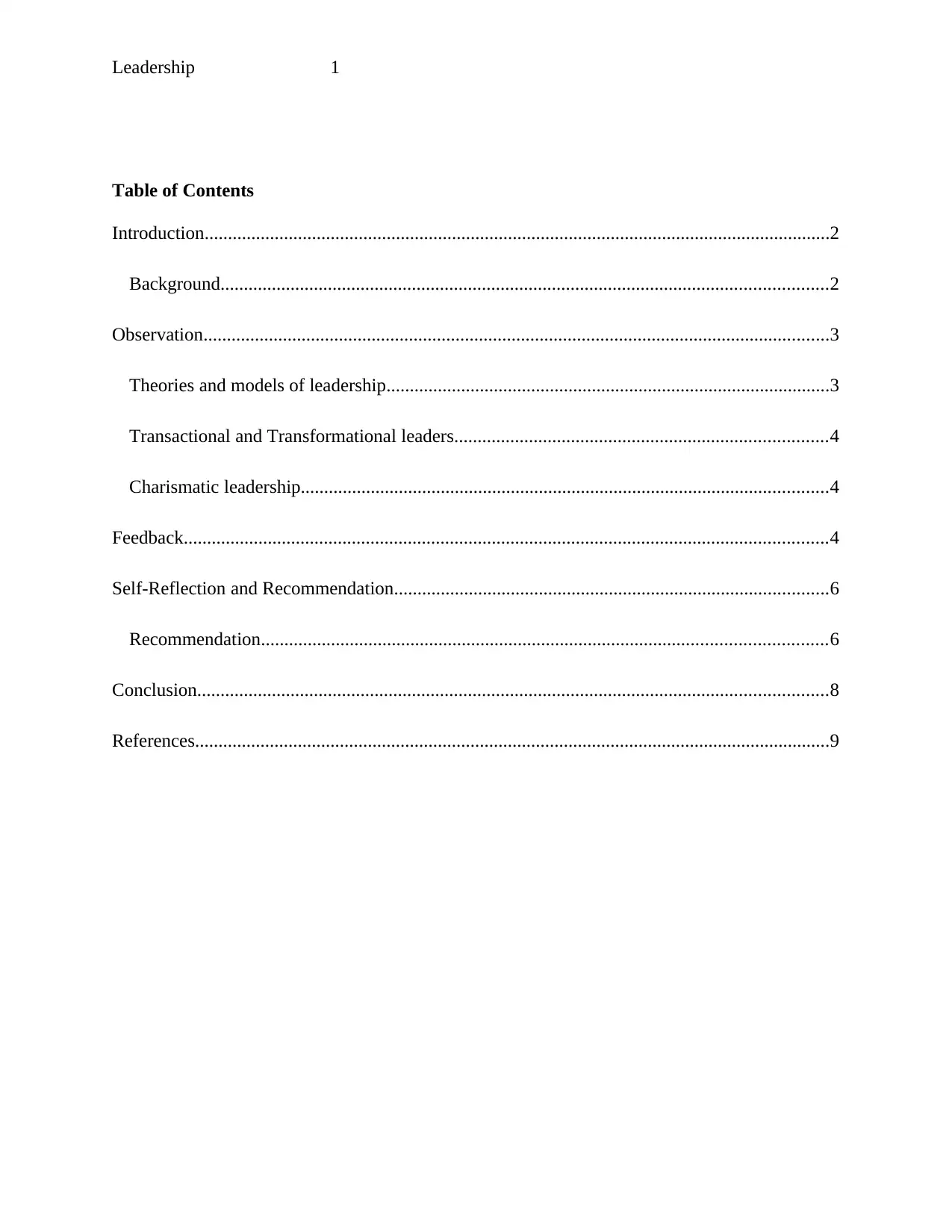
Leadership 1
Table of Contents
Introduction......................................................................................................................................2
Background..................................................................................................................................2
Observation......................................................................................................................................3
Theories and models of leadership...............................................................................................3
Transactional and Transformational leaders................................................................................4
Charismatic leadership.................................................................................................................4
Feedback..........................................................................................................................................4
Self-Reflection and Recommendation.............................................................................................6
Recommendation.........................................................................................................................6
Conclusion.......................................................................................................................................8
References........................................................................................................................................9
Table of Contents
Introduction......................................................................................................................................2
Background..................................................................................................................................2
Observation......................................................................................................................................3
Theories and models of leadership...............................................................................................3
Transactional and Transformational leaders................................................................................4
Charismatic leadership.................................................................................................................4
Feedback..........................................................................................................................................4
Self-Reflection and Recommendation.............................................................................................6
Recommendation.........................................................................................................................6
Conclusion.......................................................................................................................................8
References........................................................................................................................................9
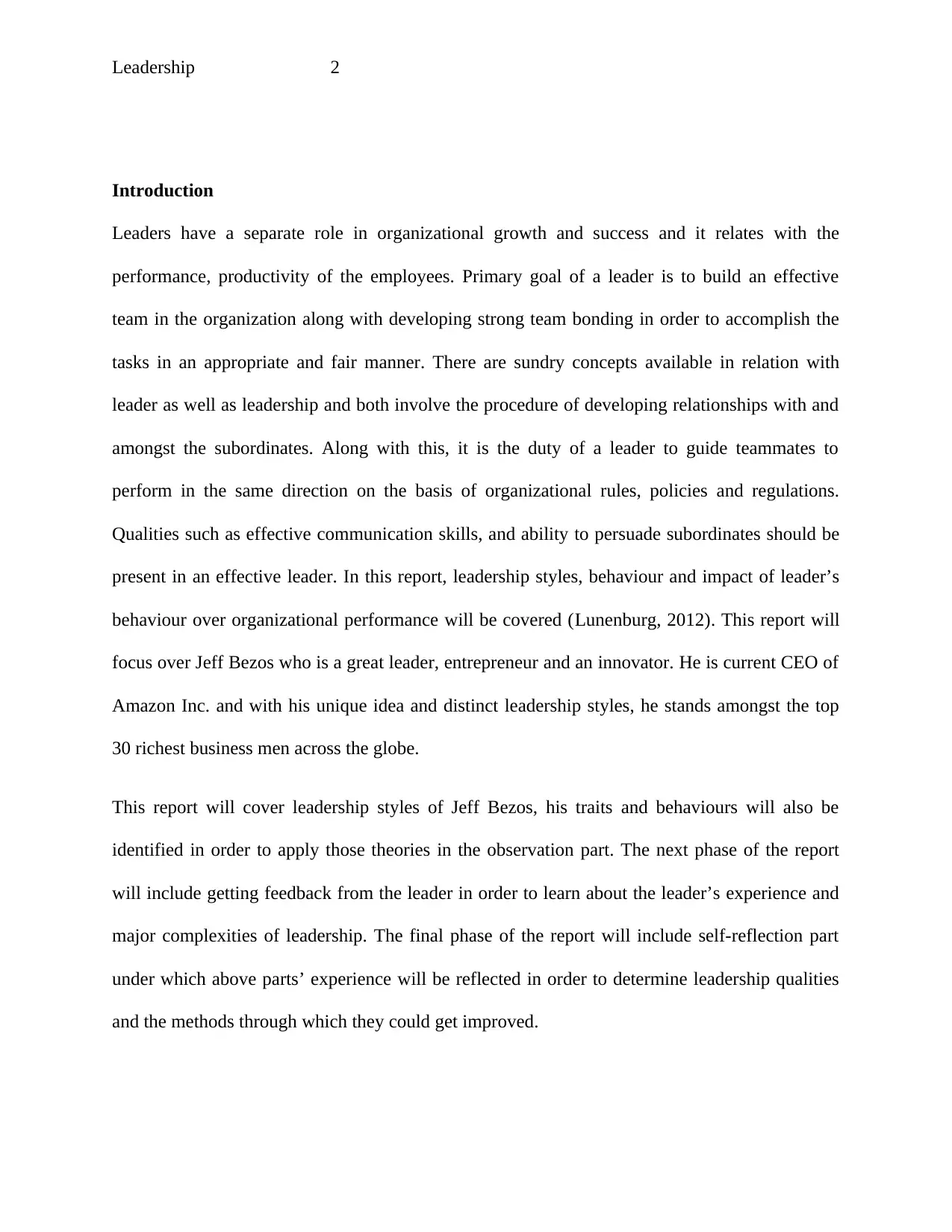
Leadership 2
Introduction
Leaders have a separate role in organizational growth and success and it relates with the
performance, productivity of the employees. Primary goal of a leader is to build an effective
team in the organization along with developing strong team bonding in order to accomplish the
tasks in an appropriate and fair manner. There are sundry concepts available in relation with
leader as well as leadership and both involve the procedure of developing relationships with and
amongst the subordinates. Along with this, it is the duty of a leader to guide teammates to
perform in the same direction on the basis of organizational rules, policies and regulations.
Qualities such as effective communication skills, and ability to persuade subordinates should be
present in an effective leader. In this report, leadership styles, behaviour and impact of leader’s
behaviour over organizational performance will be covered (Lunenburg, 2012). This report will
focus over Jeff Bezos who is a great leader, entrepreneur and an innovator. He is current CEO of
Amazon Inc. and with his unique idea and distinct leadership styles, he stands amongst the top
30 richest business men across the globe.
This report will cover leadership styles of Jeff Bezos, his traits and behaviours will also be
identified in order to apply those theories in the observation part. The next phase of the report
will include getting feedback from the leader in order to learn about the leader’s experience and
major complexities of leadership. The final phase of the report will include self-reflection part
under which above parts’ experience will be reflected in order to determine leadership qualities
and the methods through which they could get improved.
Introduction
Leaders have a separate role in organizational growth and success and it relates with the
performance, productivity of the employees. Primary goal of a leader is to build an effective
team in the organization along with developing strong team bonding in order to accomplish the
tasks in an appropriate and fair manner. There are sundry concepts available in relation with
leader as well as leadership and both involve the procedure of developing relationships with and
amongst the subordinates. Along with this, it is the duty of a leader to guide teammates to
perform in the same direction on the basis of organizational rules, policies and regulations.
Qualities such as effective communication skills, and ability to persuade subordinates should be
present in an effective leader. In this report, leadership styles, behaviour and impact of leader’s
behaviour over organizational performance will be covered (Lunenburg, 2012). This report will
focus over Jeff Bezos who is a great leader, entrepreneur and an innovator. He is current CEO of
Amazon Inc. and with his unique idea and distinct leadership styles, he stands amongst the top
30 richest business men across the globe.
This report will cover leadership styles of Jeff Bezos, his traits and behaviours will also be
identified in order to apply those theories in the observation part. The next phase of the report
will include getting feedback from the leader in order to learn about the leader’s experience and
major complexities of leadership. The final phase of the report will include self-reflection part
under which above parts’ experience will be reflected in order to determine leadership qualities
and the methods through which they could get improved.
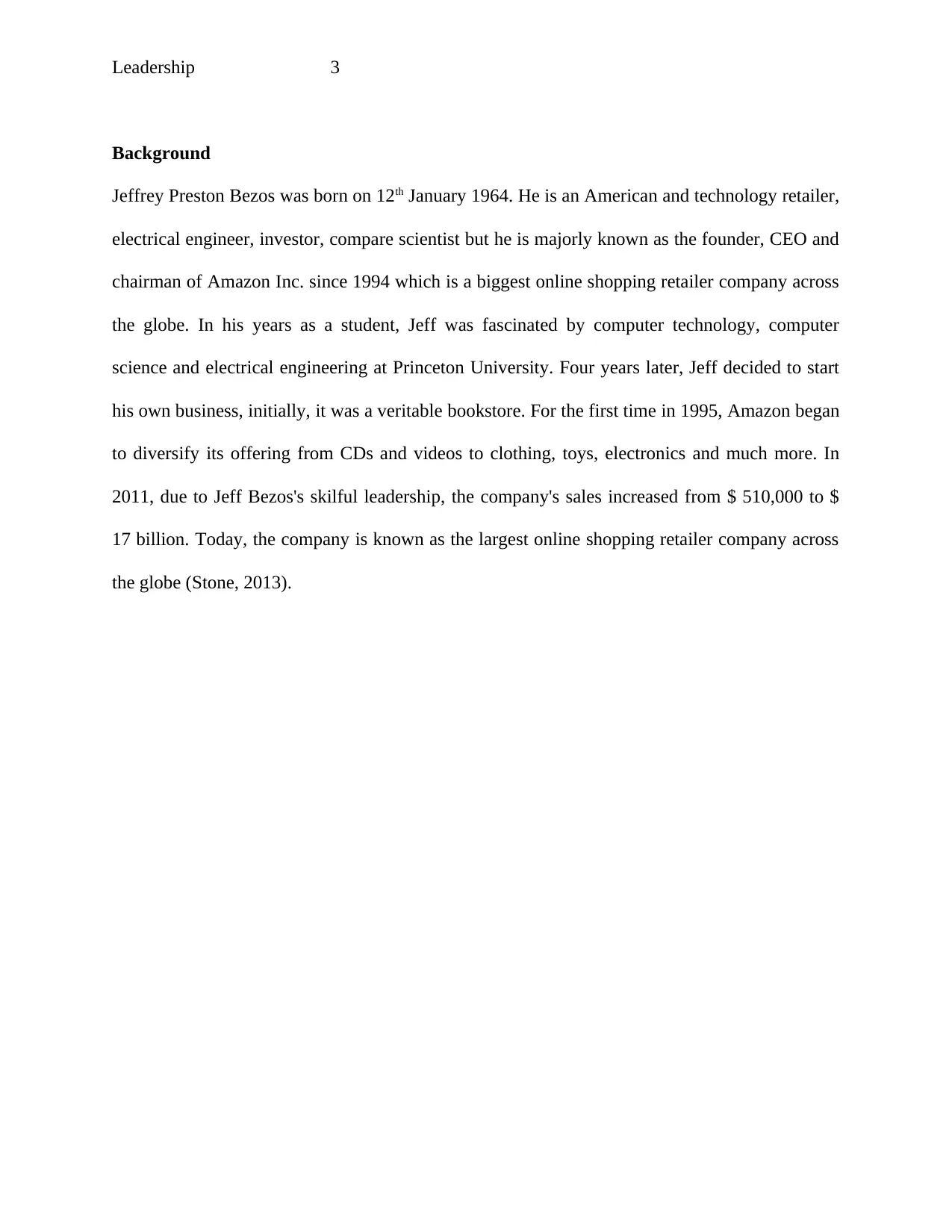
Leadership 3
Background
Jeffrey Preston Bezos was born on 12th January 1964. He is an American and technology retailer,
electrical engineer, investor, compare scientist but he is majorly known as the founder, CEO and
chairman of Amazon Inc. since 1994 which is a biggest online shopping retailer company across
the globe. In his years as a student, Jeff was fascinated by computer technology, computer
science and electrical engineering at Princeton University. Four years later, Jeff decided to start
his own business, initially, it was a veritable bookstore. For the first time in 1995, Amazon began
to diversify its offering from CDs and videos to clothing, toys, electronics and much more. In
2011, due to Jeff Bezos's skilful leadership, the company's sales increased from $ 510,000 to $
17 billion. Today, the company is known as the largest online shopping retailer company across
the globe (Stone, 2013).
Background
Jeffrey Preston Bezos was born on 12th January 1964. He is an American and technology retailer,
electrical engineer, investor, compare scientist but he is majorly known as the founder, CEO and
chairman of Amazon Inc. since 1994 which is a biggest online shopping retailer company across
the globe. In his years as a student, Jeff was fascinated by computer technology, computer
science and electrical engineering at Princeton University. Four years later, Jeff decided to start
his own business, initially, it was a veritable bookstore. For the first time in 1995, Amazon began
to diversify its offering from CDs and videos to clothing, toys, electronics and much more. In
2011, due to Jeff Bezos's skilful leadership, the company's sales increased from $ 510,000 to $
17 billion. Today, the company is known as the largest online shopping retailer company across
the globe (Stone, 2013).
Secure Best Marks with AI Grader
Need help grading? Try our AI Grader for instant feedback on your assignments.
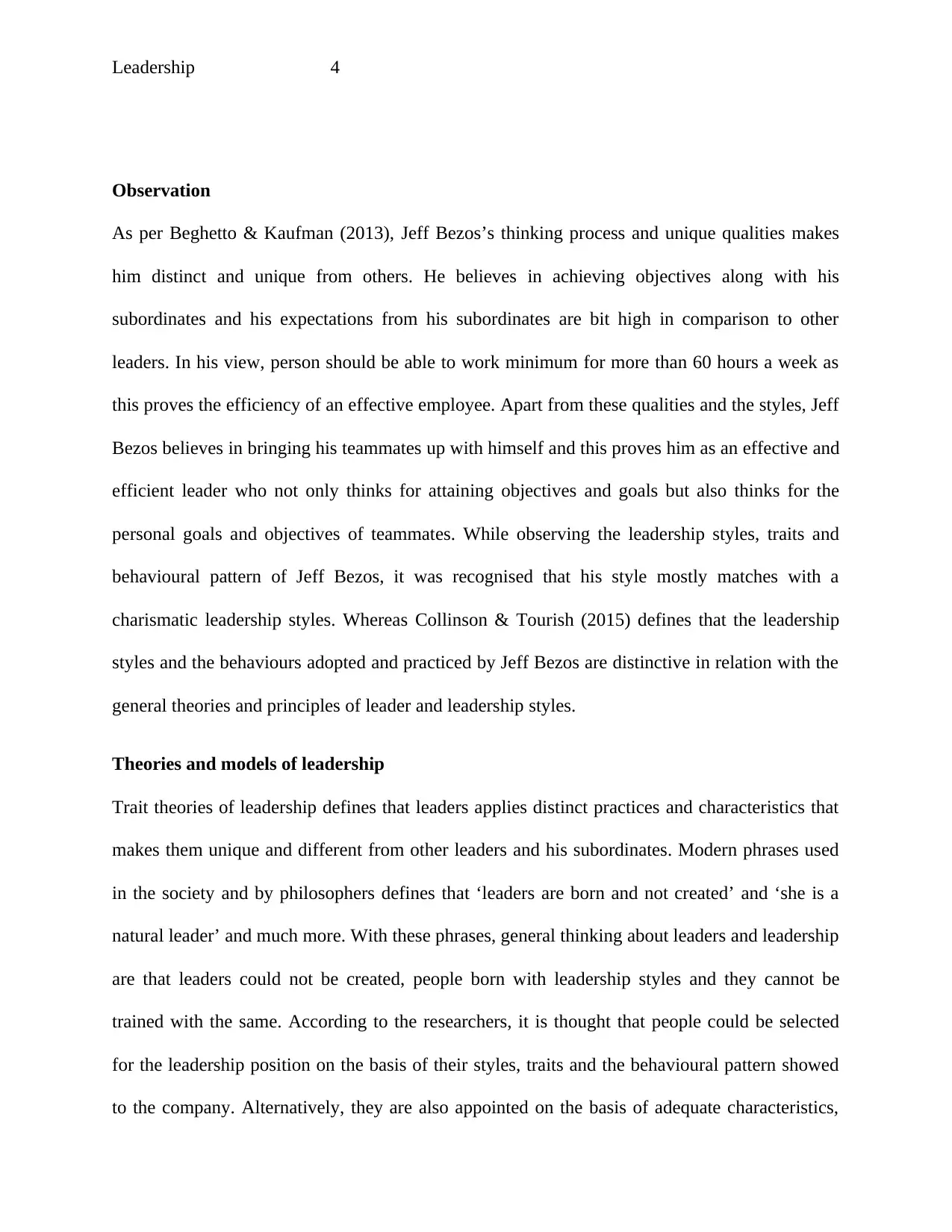
Leadership 4
Observation
As per Beghetto & Kaufman (2013), Jeff Bezos’s thinking process and unique qualities makes
him distinct and unique from others. He believes in achieving objectives along with his
subordinates and his expectations from his subordinates are bit high in comparison to other
leaders. In his view, person should be able to work minimum for more than 60 hours a week as
this proves the efficiency of an effective employee. Apart from these qualities and the styles, Jeff
Bezos believes in bringing his teammates up with himself and this proves him as an effective and
efficient leader who not only thinks for attaining objectives and goals but also thinks for the
personal goals and objectives of teammates. While observing the leadership styles, traits and
behavioural pattern of Jeff Bezos, it was recognised that his style mostly matches with a
charismatic leadership styles. Whereas Collinson & Tourish (2015) defines that the leadership
styles and the behaviours adopted and practiced by Jeff Bezos are distinctive in relation with the
general theories and principles of leader and leadership styles.
Theories and models of leadership
Trait theories of leadership defines that leaders applies distinct practices and characteristics that
makes them unique and different from other leaders and his subordinates. Modern phrases used
in the society and by philosophers defines that ‘leaders are born and not created’ and ‘she is a
natural leader’ and much more. With these phrases, general thinking about leaders and leadership
are that leaders could not be created, people born with leadership styles and they cannot be
trained with the same. According to the researchers, it is thought that people could be selected
for the leadership position on the basis of their styles, traits and the behavioural pattern showed
to the company. Alternatively, they are also appointed on the basis of adequate characteristics,
Observation
As per Beghetto & Kaufman (2013), Jeff Bezos’s thinking process and unique qualities makes
him distinct and unique from others. He believes in achieving objectives along with his
subordinates and his expectations from his subordinates are bit high in comparison to other
leaders. In his view, person should be able to work minimum for more than 60 hours a week as
this proves the efficiency of an effective employee. Apart from these qualities and the styles, Jeff
Bezos believes in bringing his teammates up with himself and this proves him as an effective and
efficient leader who not only thinks for attaining objectives and goals but also thinks for the
personal goals and objectives of teammates. While observing the leadership styles, traits and
behavioural pattern of Jeff Bezos, it was recognised that his style mostly matches with a
charismatic leadership styles. Whereas Collinson & Tourish (2015) defines that the leadership
styles and the behaviours adopted and practiced by Jeff Bezos are distinctive in relation with the
general theories and principles of leader and leadership styles.
Theories and models of leadership
Trait theories of leadership defines that leaders applies distinct practices and characteristics that
makes them unique and different from other leaders and his subordinates. Modern phrases used
in the society and by philosophers defines that ‘leaders are born and not created’ and ‘she is a
natural leader’ and much more. With these phrases, general thinking about leaders and leadership
are that leaders could not be created, people born with leadership styles and they cannot be
trained with the same. According to the researchers, it is thought that people could be selected
for the leadership position on the basis of their styles, traits and the behavioural pattern showed
to the company. Alternatively, they are also appointed on the basis of adequate characteristics,
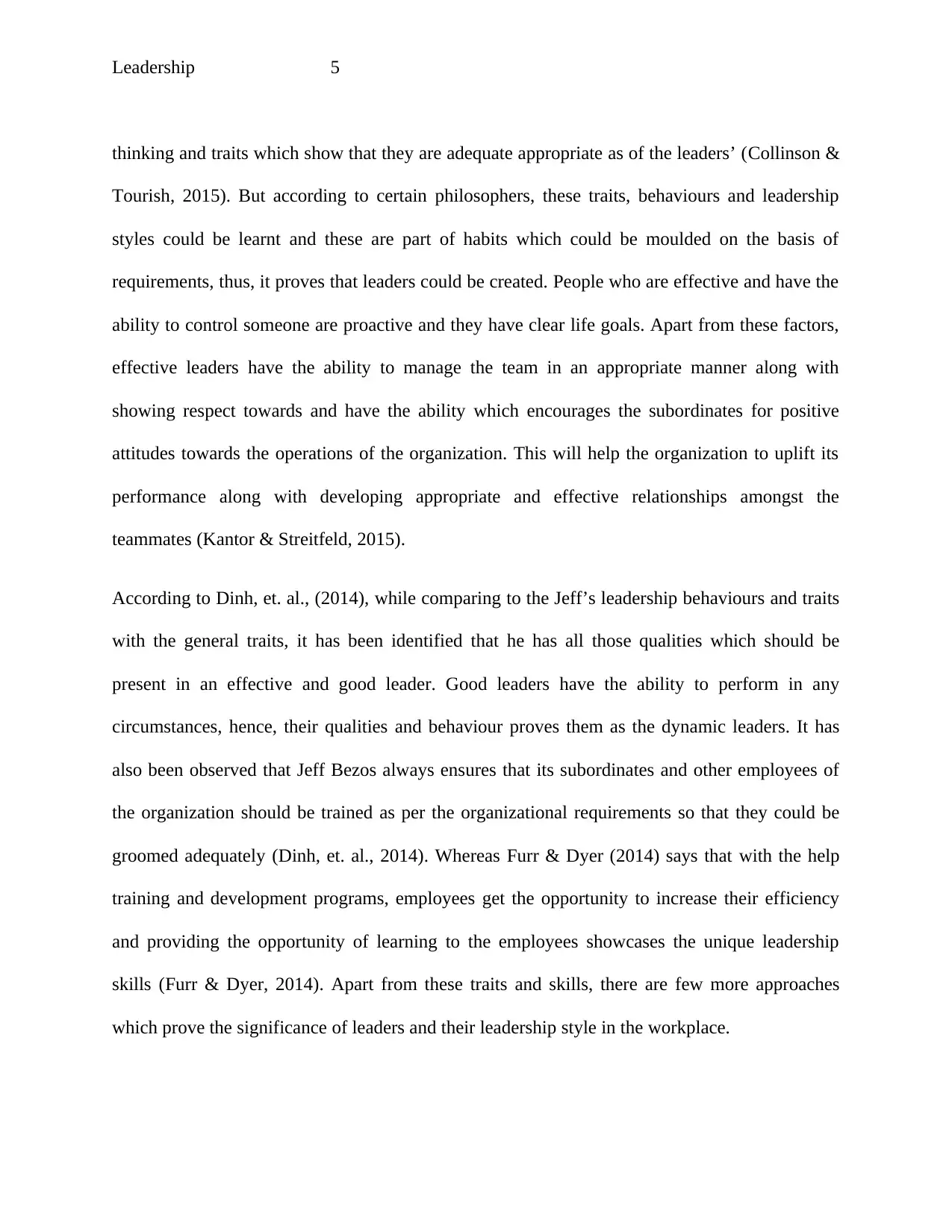
Leadership 5
thinking and traits which show that they are adequate appropriate as of the leaders’ (Collinson &
Tourish, 2015). But according to certain philosophers, these traits, behaviours and leadership
styles could be learnt and these are part of habits which could be moulded on the basis of
requirements, thus, it proves that leaders could be created. People who are effective and have the
ability to control someone are proactive and they have clear life goals. Apart from these factors,
effective leaders have the ability to manage the team in an appropriate manner along with
showing respect towards and have the ability which encourages the subordinates for positive
attitudes towards the operations of the organization. This will help the organization to uplift its
performance along with developing appropriate and effective relationships amongst the
teammates (Kantor & Streitfeld, 2015).
According to Dinh, et. al., (2014), while comparing to the Jeff’s leadership behaviours and traits
with the general traits, it has been identified that he has all those qualities which should be
present in an effective and good leader. Good leaders have the ability to perform in any
circumstances, hence, their qualities and behaviour proves them as the dynamic leaders. It has
also been observed that Jeff Bezos always ensures that its subordinates and other employees of
the organization should be trained as per the organizational requirements so that they could be
groomed adequately (Dinh, et. al., 2014). Whereas Furr & Dyer (2014) says that with the help
training and development programs, employees get the opportunity to increase their efficiency
and providing the opportunity of learning to the employees showcases the unique leadership
skills (Furr & Dyer, 2014). Apart from these traits and skills, there are few more approaches
which prove the significance of leaders and their leadership style in the workplace.
thinking and traits which show that they are adequate appropriate as of the leaders’ (Collinson &
Tourish, 2015). But according to certain philosophers, these traits, behaviours and leadership
styles could be learnt and these are part of habits which could be moulded on the basis of
requirements, thus, it proves that leaders could be created. People who are effective and have the
ability to control someone are proactive and they have clear life goals. Apart from these factors,
effective leaders have the ability to manage the team in an appropriate manner along with
showing respect towards and have the ability which encourages the subordinates for positive
attitudes towards the operations of the organization. This will help the organization to uplift its
performance along with developing appropriate and effective relationships amongst the
teammates (Kantor & Streitfeld, 2015).
According to Dinh, et. al., (2014), while comparing to the Jeff’s leadership behaviours and traits
with the general traits, it has been identified that he has all those qualities which should be
present in an effective and good leader. Good leaders have the ability to perform in any
circumstances, hence, their qualities and behaviour proves them as the dynamic leaders. It has
also been observed that Jeff Bezos always ensures that its subordinates and other employees of
the organization should be trained as per the organizational requirements so that they could be
groomed adequately (Dinh, et. al., 2014). Whereas Furr & Dyer (2014) says that with the help
training and development programs, employees get the opportunity to increase their efficiency
and providing the opportunity of learning to the employees showcases the unique leadership
skills (Furr & Dyer, 2014). Apart from these traits and skills, there are few more approaches
which prove the significance of leaders and their leadership style in the workplace.
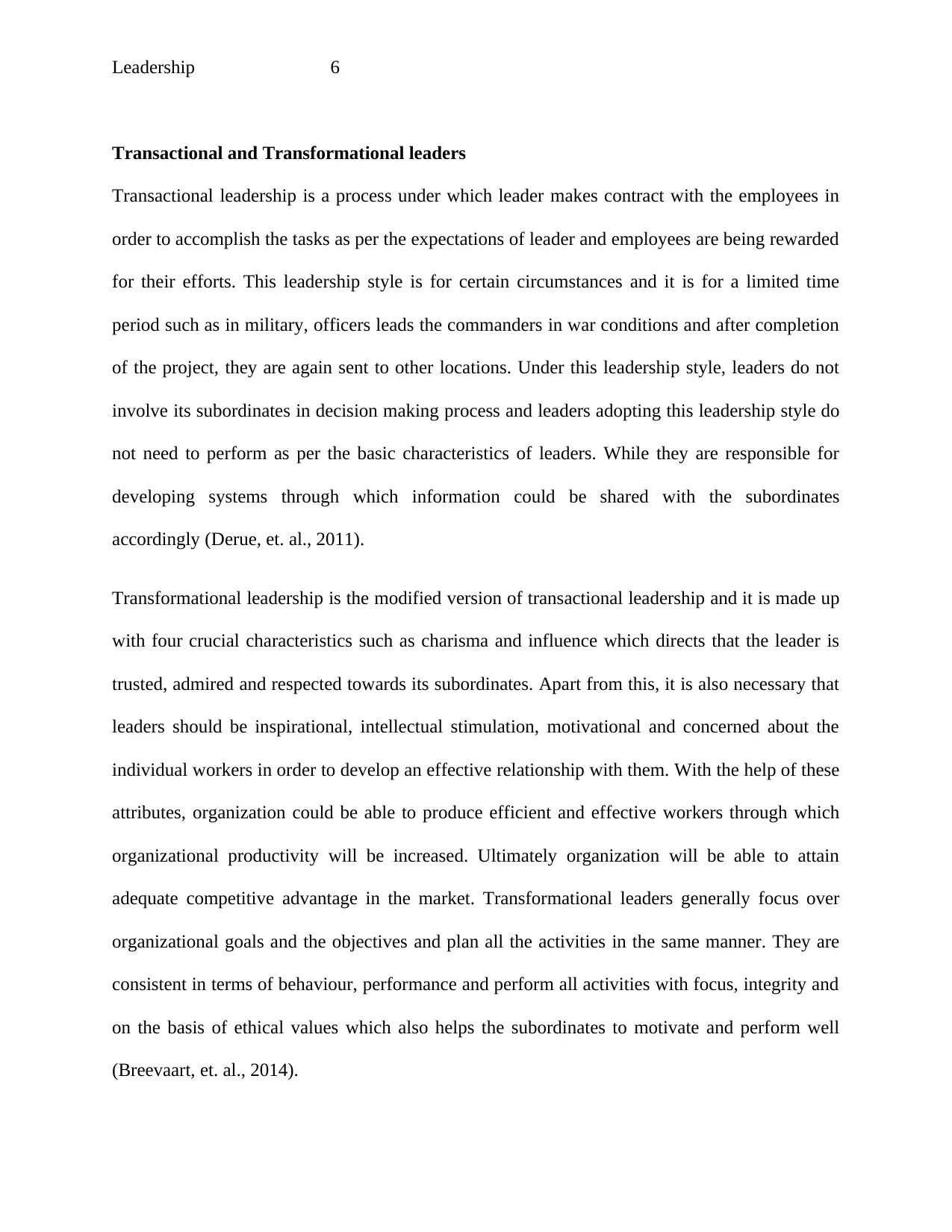
Leadership 6
Transactional and Transformational leaders
Transactional leadership is a process under which leader makes contract with the employees in
order to accomplish the tasks as per the expectations of leader and employees are being rewarded
for their efforts. This leadership style is for certain circumstances and it is for a limited time
period such as in military, officers leads the commanders in war conditions and after completion
of the project, they are again sent to other locations. Under this leadership style, leaders do not
involve its subordinates in decision making process and leaders adopting this leadership style do
not need to perform as per the basic characteristics of leaders. While they are responsible for
developing systems through which information could be shared with the subordinates
accordingly (Derue, et. al., 2011).
Transformational leadership is the modified version of transactional leadership and it is made up
with four crucial characteristics such as charisma and influence which directs that the leader is
trusted, admired and respected towards its subordinates. Apart from this, it is also necessary that
leaders should be inspirational, intellectual stimulation, motivational and concerned about the
individual workers in order to develop an effective relationship with them. With the help of these
attributes, organization could be able to produce efficient and effective workers through which
organizational productivity will be increased. Ultimately organization will be able to attain
adequate competitive advantage in the market. Transformational leaders generally focus over
organizational goals and the objectives and plan all the activities in the same manner. They are
consistent in terms of behaviour, performance and perform all activities with focus, integrity and
on the basis of ethical values which also helps the subordinates to motivate and perform well
(Breevaart, et. al., 2014).
Transactional and Transformational leaders
Transactional leadership is a process under which leader makes contract with the employees in
order to accomplish the tasks as per the expectations of leader and employees are being rewarded
for their efforts. This leadership style is for certain circumstances and it is for a limited time
period such as in military, officers leads the commanders in war conditions and after completion
of the project, they are again sent to other locations. Under this leadership style, leaders do not
involve its subordinates in decision making process and leaders adopting this leadership style do
not need to perform as per the basic characteristics of leaders. While they are responsible for
developing systems through which information could be shared with the subordinates
accordingly (Derue, et. al., 2011).
Transformational leadership is the modified version of transactional leadership and it is made up
with four crucial characteristics such as charisma and influence which directs that the leader is
trusted, admired and respected towards its subordinates. Apart from this, it is also necessary that
leaders should be inspirational, intellectual stimulation, motivational and concerned about the
individual workers in order to develop an effective relationship with them. With the help of these
attributes, organization could be able to produce efficient and effective workers through which
organizational productivity will be increased. Ultimately organization will be able to attain
adequate competitive advantage in the market. Transformational leaders generally focus over
organizational goals and the objectives and plan all the activities in the same manner. They are
consistent in terms of behaviour, performance and perform all activities with focus, integrity and
on the basis of ethical values which also helps the subordinates to motivate and perform well
(Breevaart, et. al., 2014).
Paraphrase This Document
Need a fresh take? Get an instant paraphrase of this document with our AI Paraphraser
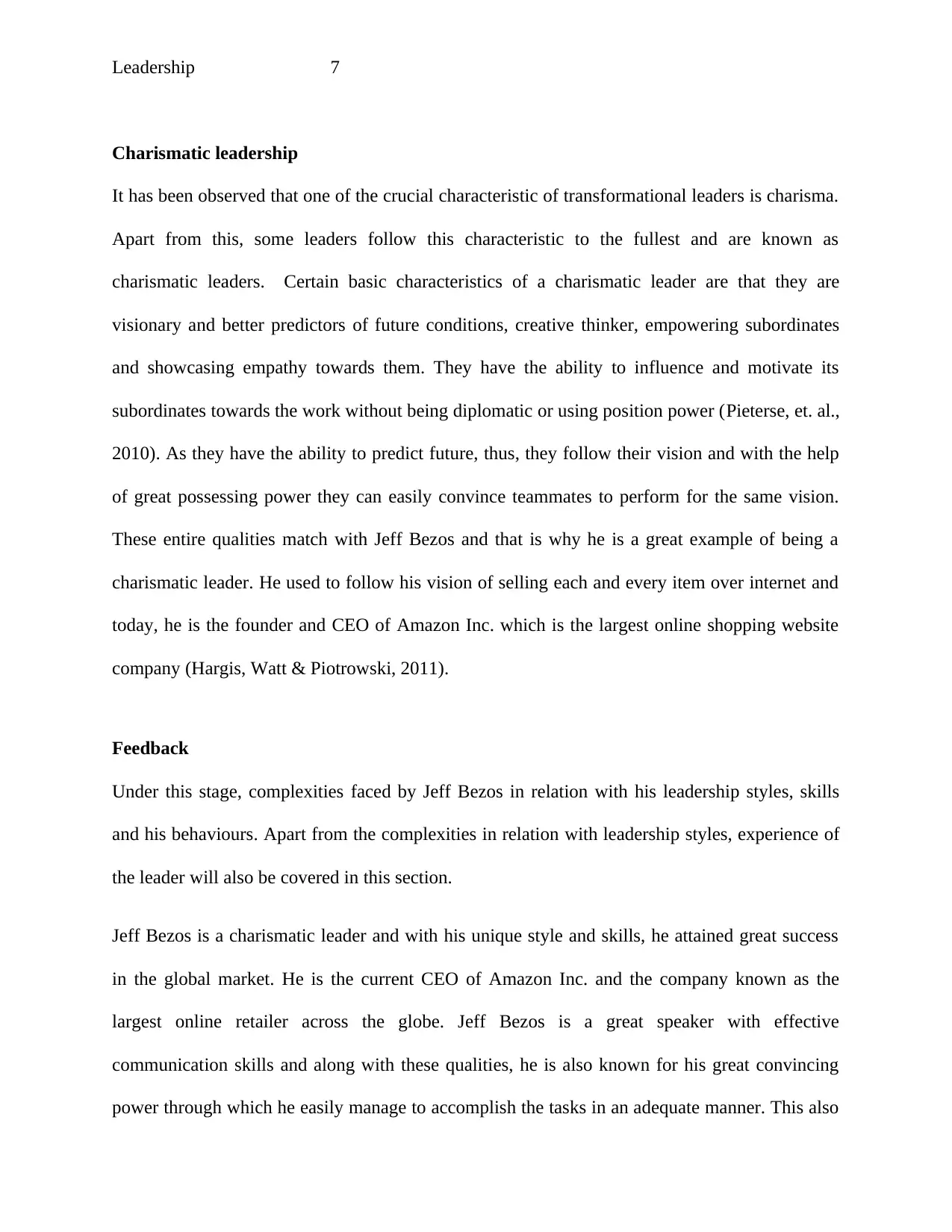
Leadership 7
Charismatic leadership
It has been observed that one of the crucial characteristic of transformational leaders is charisma.
Apart from this, some leaders follow this characteristic to the fullest and are known as
charismatic leaders. Certain basic characteristics of a charismatic leader are that they are
visionary and better predictors of future conditions, creative thinker, empowering subordinates
and showcasing empathy towards them. They have the ability to influence and motivate its
subordinates towards the work without being diplomatic or using position power (Pieterse, et. al.,
2010). As they have the ability to predict future, thus, they follow their vision and with the help
of great possessing power they can easily convince teammates to perform for the same vision.
These entire qualities match with Jeff Bezos and that is why he is a great example of being a
charismatic leader. He used to follow his vision of selling each and every item over internet and
today, he is the founder and CEO of Amazon Inc. which is the largest online shopping website
company (Hargis, Watt & Piotrowski, 2011).
Feedback
Under this stage, complexities faced by Jeff Bezos in relation with his leadership styles, skills
and his behaviours. Apart from the complexities in relation with leadership styles, experience of
the leader will also be covered in this section.
Jeff Bezos is a charismatic leader and with his unique style and skills, he attained great success
in the global market. He is the current CEO of Amazon Inc. and the company known as the
largest online retailer across the globe. Jeff Bezos is a great speaker with effective
communication skills and along with these qualities, he is also known for his great convincing
power through which he easily manage to accomplish the tasks in an adequate manner. This also
Charismatic leadership
It has been observed that one of the crucial characteristic of transformational leaders is charisma.
Apart from this, some leaders follow this characteristic to the fullest and are known as
charismatic leaders. Certain basic characteristics of a charismatic leader are that they are
visionary and better predictors of future conditions, creative thinker, empowering subordinates
and showcasing empathy towards them. They have the ability to influence and motivate its
subordinates towards the work without being diplomatic or using position power (Pieterse, et. al.,
2010). As they have the ability to predict future, thus, they follow their vision and with the help
of great possessing power they can easily convince teammates to perform for the same vision.
These entire qualities match with Jeff Bezos and that is why he is a great example of being a
charismatic leader. He used to follow his vision of selling each and every item over internet and
today, he is the founder and CEO of Amazon Inc. which is the largest online shopping website
company (Hargis, Watt & Piotrowski, 2011).
Feedback
Under this stage, complexities faced by Jeff Bezos in relation with his leadership styles, skills
and his behaviours. Apart from the complexities in relation with leadership styles, experience of
the leader will also be covered in this section.
Jeff Bezos is a charismatic leader and with his unique style and skills, he attained great success
in the global market. He is the current CEO of Amazon Inc. and the company known as the
largest online retailer across the globe. Jeff Bezos is a great speaker with effective
communication skills and along with these qualities, he is also known for his great convincing
power through which he easily manage to accomplish the tasks in an adequate manner. This also
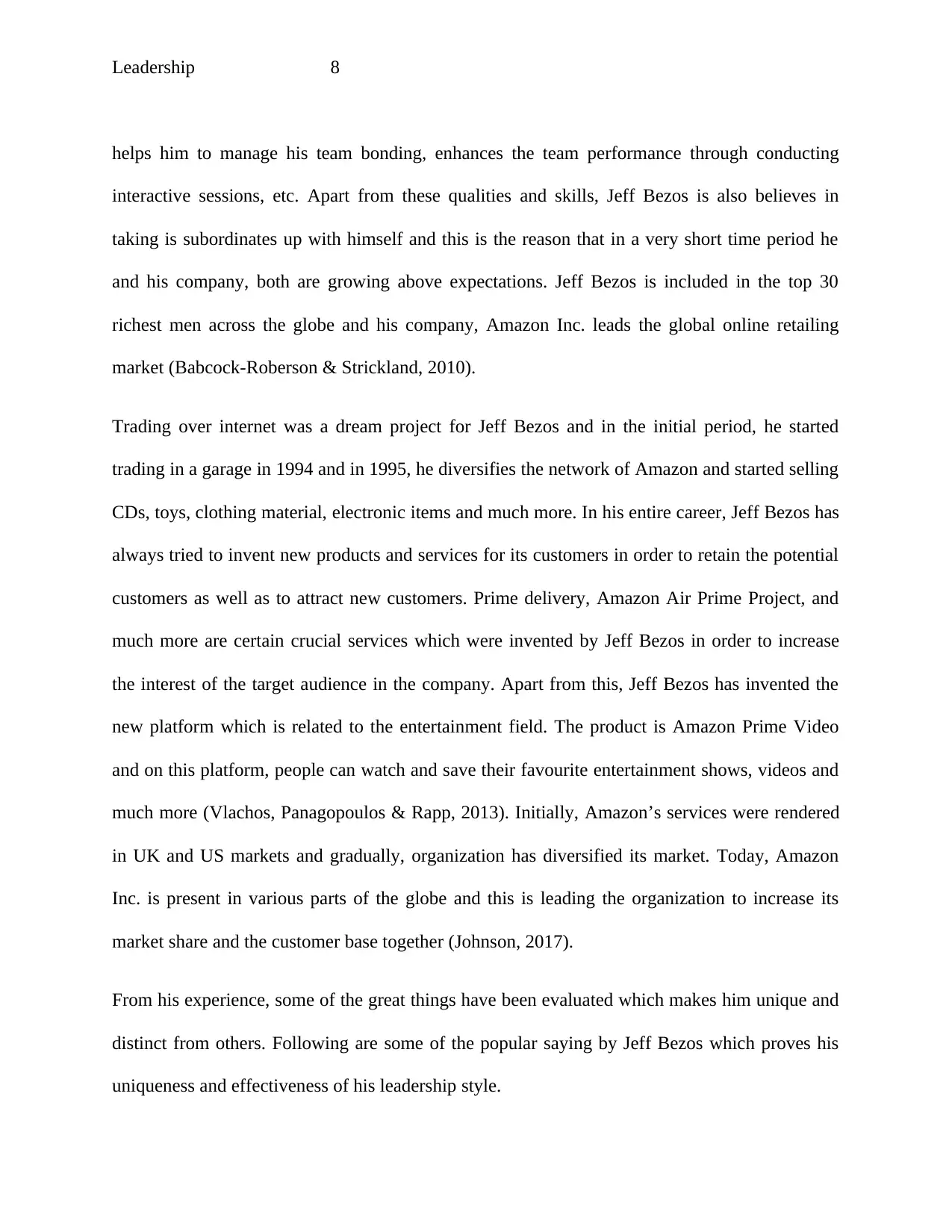
Leadership 8
helps him to manage his team bonding, enhances the team performance through conducting
interactive sessions, etc. Apart from these qualities and skills, Jeff Bezos is also believes in
taking is subordinates up with himself and this is the reason that in a very short time period he
and his company, both are growing above expectations. Jeff Bezos is included in the top 30
richest men across the globe and his company, Amazon Inc. leads the global online retailing
market (Babcock-Roberson & Strickland, 2010).
Trading over internet was a dream project for Jeff Bezos and in the initial period, he started
trading in a garage in 1994 and in 1995, he diversifies the network of Amazon and started selling
CDs, toys, clothing material, electronic items and much more. In his entire career, Jeff Bezos has
always tried to invent new products and services for its customers in order to retain the potential
customers as well as to attract new customers. Prime delivery, Amazon Air Prime Project, and
much more are certain crucial services which were invented by Jeff Bezos in order to increase
the interest of the target audience in the company. Apart from this, Jeff Bezos has invented the
new platform which is related to the entertainment field. The product is Amazon Prime Video
and on this platform, people can watch and save their favourite entertainment shows, videos and
much more (Vlachos, Panagopoulos & Rapp, 2013). Initially, Amazon’s services were rendered
in UK and US markets and gradually, organization has diversified its market. Today, Amazon
Inc. is present in various parts of the globe and this is leading the organization to increase its
market share and the customer base together (Johnson, 2017).
From his experience, some of the great things have been evaluated which makes him unique and
distinct from others. Following are some of the popular saying by Jeff Bezos which proves his
uniqueness and effectiveness of his leadership style.
helps him to manage his team bonding, enhances the team performance through conducting
interactive sessions, etc. Apart from these qualities and skills, Jeff Bezos is also believes in
taking is subordinates up with himself and this is the reason that in a very short time period he
and his company, both are growing above expectations. Jeff Bezos is included in the top 30
richest men across the globe and his company, Amazon Inc. leads the global online retailing
market (Babcock-Roberson & Strickland, 2010).
Trading over internet was a dream project for Jeff Bezos and in the initial period, he started
trading in a garage in 1994 and in 1995, he diversifies the network of Amazon and started selling
CDs, toys, clothing material, electronic items and much more. In his entire career, Jeff Bezos has
always tried to invent new products and services for its customers in order to retain the potential
customers as well as to attract new customers. Prime delivery, Amazon Air Prime Project, and
much more are certain crucial services which were invented by Jeff Bezos in order to increase
the interest of the target audience in the company. Apart from this, Jeff Bezos has invented the
new platform which is related to the entertainment field. The product is Amazon Prime Video
and on this platform, people can watch and save their favourite entertainment shows, videos and
much more (Vlachos, Panagopoulos & Rapp, 2013). Initially, Amazon’s services were rendered
in UK and US markets and gradually, organization has diversified its market. Today, Amazon
Inc. is present in various parts of the globe and this is leading the organization to increase its
market share and the customer base together (Johnson, 2017).
From his experience, some of the great things have been evaluated which makes him unique and
distinct from others. Following are some of the popular saying by Jeff Bezos which proves his
uniqueness and effectiveness of his leadership style.
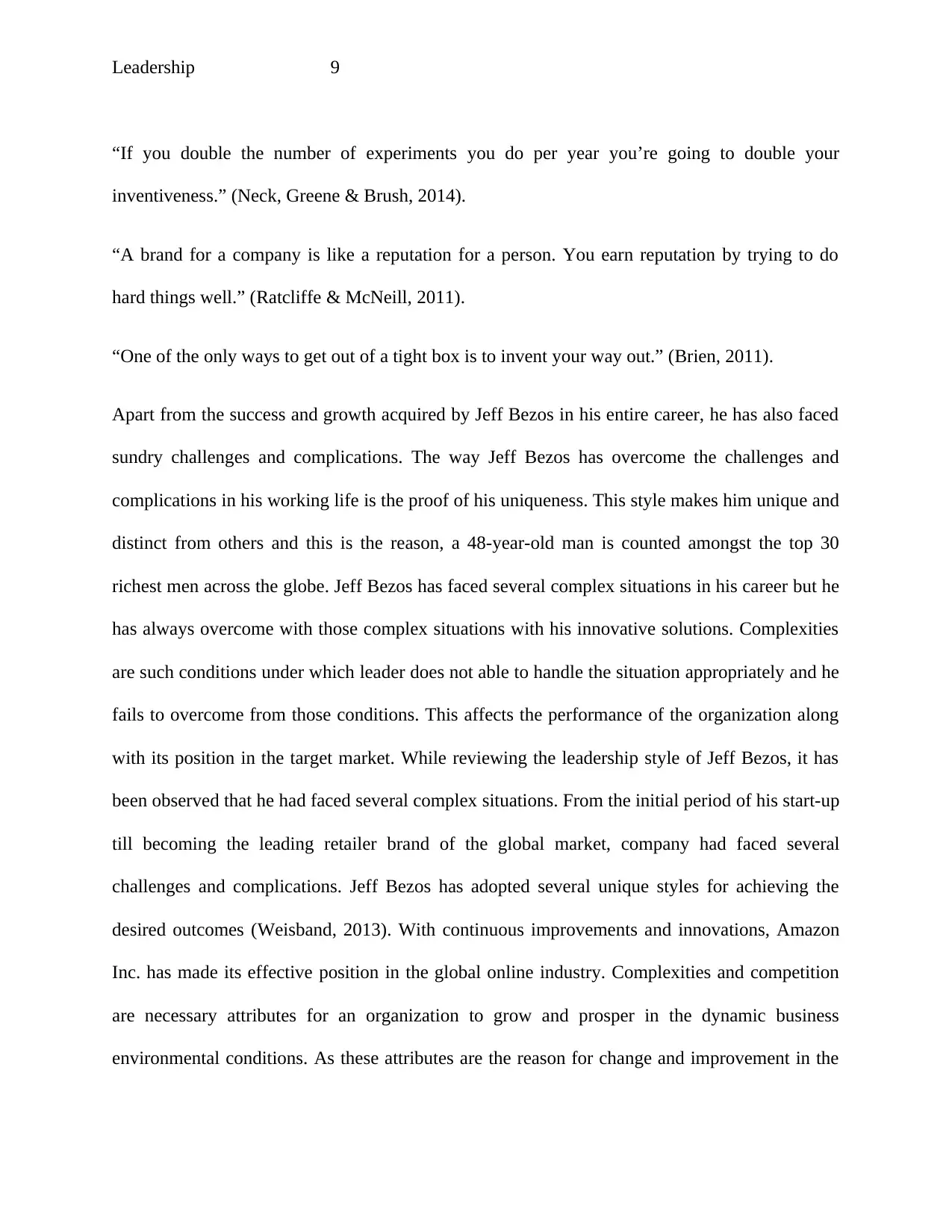
Leadership 9
“If you double the number of experiments you do per year you’re going to double your
inventiveness.” (Neck, Greene & Brush, 2014).
“A brand for a company is like a reputation for a person. You earn reputation by trying to do
hard things well.” (Ratcliffe & McNeill, 2011).
“One of the only ways to get out of a tight box is to invent your way out.” (Brien, 2011).
Apart from the success and growth acquired by Jeff Bezos in his entire career, he has also faced
sundry challenges and complications. The way Jeff Bezos has overcome the challenges and
complications in his working life is the proof of his uniqueness. This style makes him unique and
distinct from others and this is the reason, a 48-year-old man is counted amongst the top 30
richest men across the globe. Jeff Bezos has faced several complex situations in his career but he
has always overcome with those complex situations with his innovative solutions. Complexities
are such conditions under which leader does not able to handle the situation appropriately and he
fails to overcome from those conditions. This affects the performance of the organization along
with its position in the target market. While reviewing the leadership style of Jeff Bezos, it has
been observed that he had faced several complex situations. From the initial period of his start-up
till becoming the leading retailer brand of the global market, company had faced several
challenges and complications. Jeff Bezos has adopted several unique styles for achieving the
desired outcomes (Weisband, 2013). With continuous improvements and innovations, Amazon
Inc. has made its effective position in the global online industry. Complexities and competition
are necessary attributes for an organization to grow and prosper in the dynamic business
environmental conditions. As these attributes are the reason for change and improvement in the
“If you double the number of experiments you do per year you’re going to double your
inventiveness.” (Neck, Greene & Brush, 2014).
“A brand for a company is like a reputation for a person. You earn reputation by trying to do
hard things well.” (Ratcliffe & McNeill, 2011).
“One of the only ways to get out of a tight box is to invent your way out.” (Brien, 2011).
Apart from the success and growth acquired by Jeff Bezos in his entire career, he has also faced
sundry challenges and complications. The way Jeff Bezos has overcome the challenges and
complications in his working life is the proof of his uniqueness. This style makes him unique and
distinct from others and this is the reason, a 48-year-old man is counted amongst the top 30
richest men across the globe. Jeff Bezos has faced several complex situations in his career but he
has always overcome with those complex situations with his innovative solutions. Complexities
are such conditions under which leader does not able to handle the situation appropriately and he
fails to overcome from those conditions. This affects the performance of the organization along
with its position in the target market. While reviewing the leadership style of Jeff Bezos, it has
been observed that he had faced several complex situations. From the initial period of his start-up
till becoming the leading retailer brand of the global market, company had faced several
challenges and complications. Jeff Bezos has adopted several unique styles for achieving the
desired outcomes (Weisband, 2013). With continuous improvements and innovations, Amazon
Inc. has made its effective position in the global online industry. Complexities and competition
are necessary attributes for an organization to grow and prosper in the dynamic business
environmental conditions. As these attributes are the reason for change and improvement in the
Secure Best Marks with AI Grader
Need help grading? Try our AI Grader for instant feedback on your assignments.
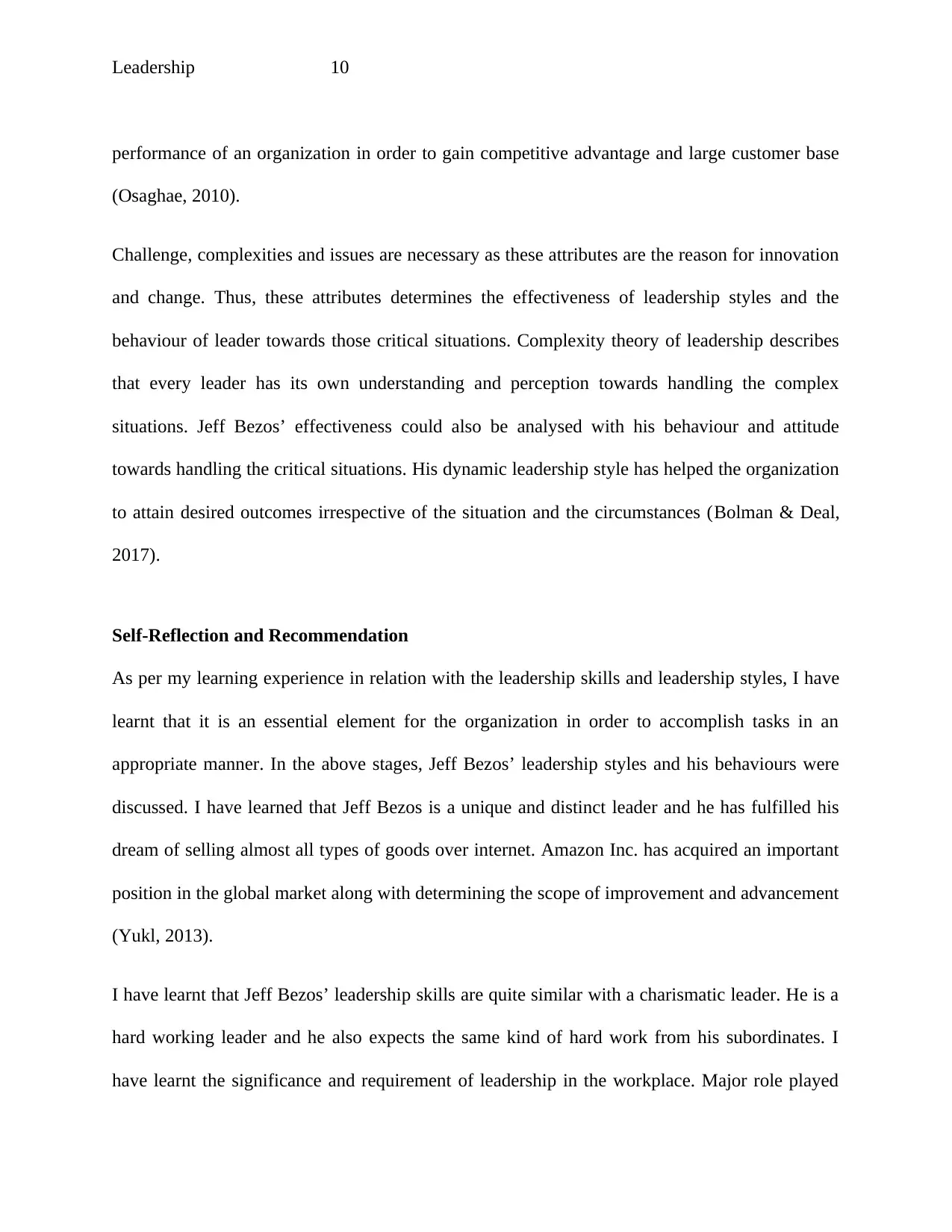
Leadership 10
performance of an organization in order to gain competitive advantage and large customer base
(Osaghae, 2010).
Challenge, complexities and issues are necessary as these attributes are the reason for innovation
and change. Thus, these attributes determines the effectiveness of leadership styles and the
behaviour of leader towards those critical situations. Complexity theory of leadership describes
that every leader has its own understanding and perception towards handling the complex
situations. Jeff Bezos’ effectiveness could also be analysed with his behaviour and attitude
towards handling the critical situations. His dynamic leadership style has helped the organization
to attain desired outcomes irrespective of the situation and the circumstances (Bolman & Deal,
2017).
Self-Reflection and Recommendation
As per my learning experience in relation with the leadership skills and leadership styles, I have
learnt that it is an essential element for the organization in order to accomplish tasks in an
appropriate manner. In the above stages, Jeff Bezos’ leadership styles and his behaviours were
discussed. I have learned that Jeff Bezos is a unique and distinct leader and he has fulfilled his
dream of selling almost all types of goods over internet. Amazon Inc. has acquired an important
position in the global market along with determining the scope of improvement and advancement
(Yukl, 2013).
I have learnt that Jeff Bezos’ leadership skills are quite similar with a charismatic leader. He is a
hard working leader and he also expects the same kind of hard work from his subordinates. I
have learnt the significance and requirement of leadership in the workplace. Major role played
performance of an organization in order to gain competitive advantage and large customer base
(Osaghae, 2010).
Challenge, complexities and issues are necessary as these attributes are the reason for innovation
and change. Thus, these attributes determines the effectiveness of leadership styles and the
behaviour of leader towards those critical situations. Complexity theory of leadership describes
that every leader has its own understanding and perception towards handling the complex
situations. Jeff Bezos’ effectiveness could also be analysed with his behaviour and attitude
towards handling the critical situations. His dynamic leadership style has helped the organization
to attain desired outcomes irrespective of the situation and the circumstances (Bolman & Deal,
2017).
Self-Reflection and Recommendation
As per my learning experience in relation with the leadership skills and leadership styles, I have
learnt that it is an essential element for the organization in order to accomplish tasks in an
appropriate manner. In the above stages, Jeff Bezos’ leadership styles and his behaviours were
discussed. I have learned that Jeff Bezos is a unique and distinct leader and he has fulfilled his
dream of selling almost all types of goods over internet. Amazon Inc. has acquired an important
position in the global market along with determining the scope of improvement and advancement
(Yukl, 2013).
I have learnt that Jeff Bezos’ leadership skills are quite similar with a charismatic leader. He is a
hard working leader and he also expects the same kind of hard work from his subordinates. I
have learnt the significance and requirement of leadership in the workplace. Major role played
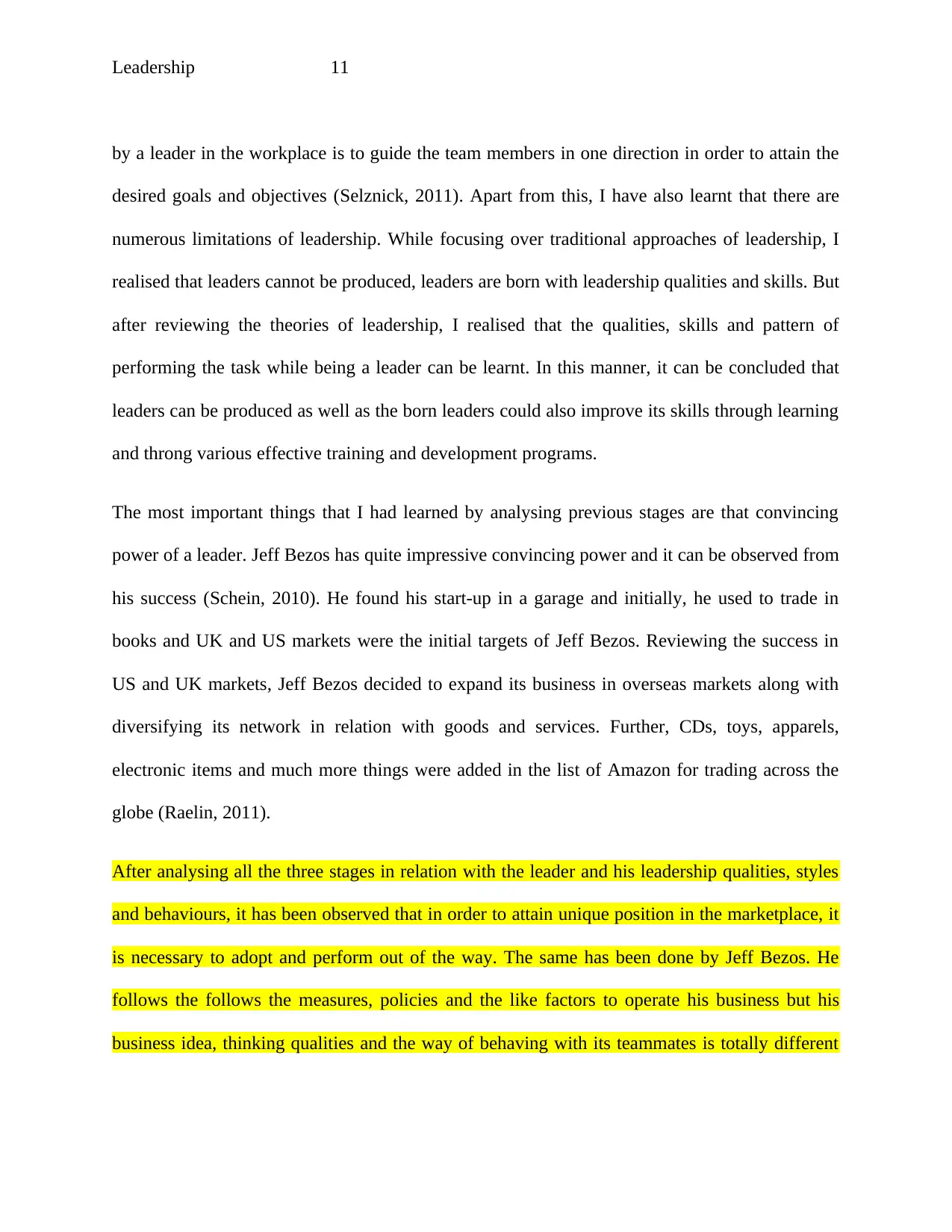
Leadership 11
by a leader in the workplace is to guide the team members in one direction in order to attain the
desired goals and objectives (Selznick, 2011). Apart from this, I have also learnt that there are
numerous limitations of leadership. While focusing over traditional approaches of leadership, I
realised that leaders cannot be produced, leaders are born with leadership qualities and skills. But
after reviewing the theories of leadership, I realised that the qualities, skills and pattern of
performing the task while being a leader can be learnt. In this manner, it can be concluded that
leaders can be produced as well as the born leaders could also improve its skills through learning
and throng various effective training and development programs.
The most important things that I had learned by analysing previous stages are that convincing
power of a leader. Jeff Bezos has quite impressive convincing power and it can be observed from
his success (Schein, 2010). He found his start-up in a garage and initially, he used to trade in
books and UK and US markets were the initial targets of Jeff Bezos. Reviewing the success in
US and UK markets, Jeff Bezos decided to expand its business in overseas markets along with
diversifying its network in relation with goods and services. Further, CDs, toys, apparels,
electronic items and much more things were added in the list of Amazon for trading across the
globe (Raelin, 2011).
After analysing all the three stages in relation with the leader and his leadership qualities, styles
and behaviours, it has been observed that in order to attain unique position in the marketplace, it
is necessary to adopt and perform out of the way. The same has been done by Jeff Bezos. He
follows the follows the measures, policies and the like factors to operate his business but his
business idea, thinking qualities and the way of behaving with its teammates is totally different
by a leader in the workplace is to guide the team members in one direction in order to attain the
desired goals and objectives (Selznick, 2011). Apart from this, I have also learnt that there are
numerous limitations of leadership. While focusing over traditional approaches of leadership, I
realised that leaders cannot be produced, leaders are born with leadership qualities and skills. But
after reviewing the theories of leadership, I realised that the qualities, skills and pattern of
performing the task while being a leader can be learnt. In this manner, it can be concluded that
leaders can be produced as well as the born leaders could also improve its skills through learning
and throng various effective training and development programs.
The most important things that I had learned by analysing previous stages are that convincing
power of a leader. Jeff Bezos has quite impressive convincing power and it can be observed from
his success (Schein, 2010). He found his start-up in a garage and initially, he used to trade in
books and UK and US markets were the initial targets of Jeff Bezos. Reviewing the success in
US and UK markets, Jeff Bezos decided to expand its business in overseas markets along with
diversifying its network in relation with goods and services. Further, CDs, toys, apparels,
electronic items and much more things were added in the list of Amazon for trading across the
globe (Raelin, 2011).
After analysing all the three stages in relation with the leader and his leadership qualities, styles
and behaviours, it has been observed that in order to attain unique position in the marketplace, it
is necessary to adopt and perform out of the way. The same has been done by Jeff Bezos. He
follows the follows the measures, policies and the like factors to operate his business but his
business idea, thinking qualities and the way of behaving with its teammates is totally different
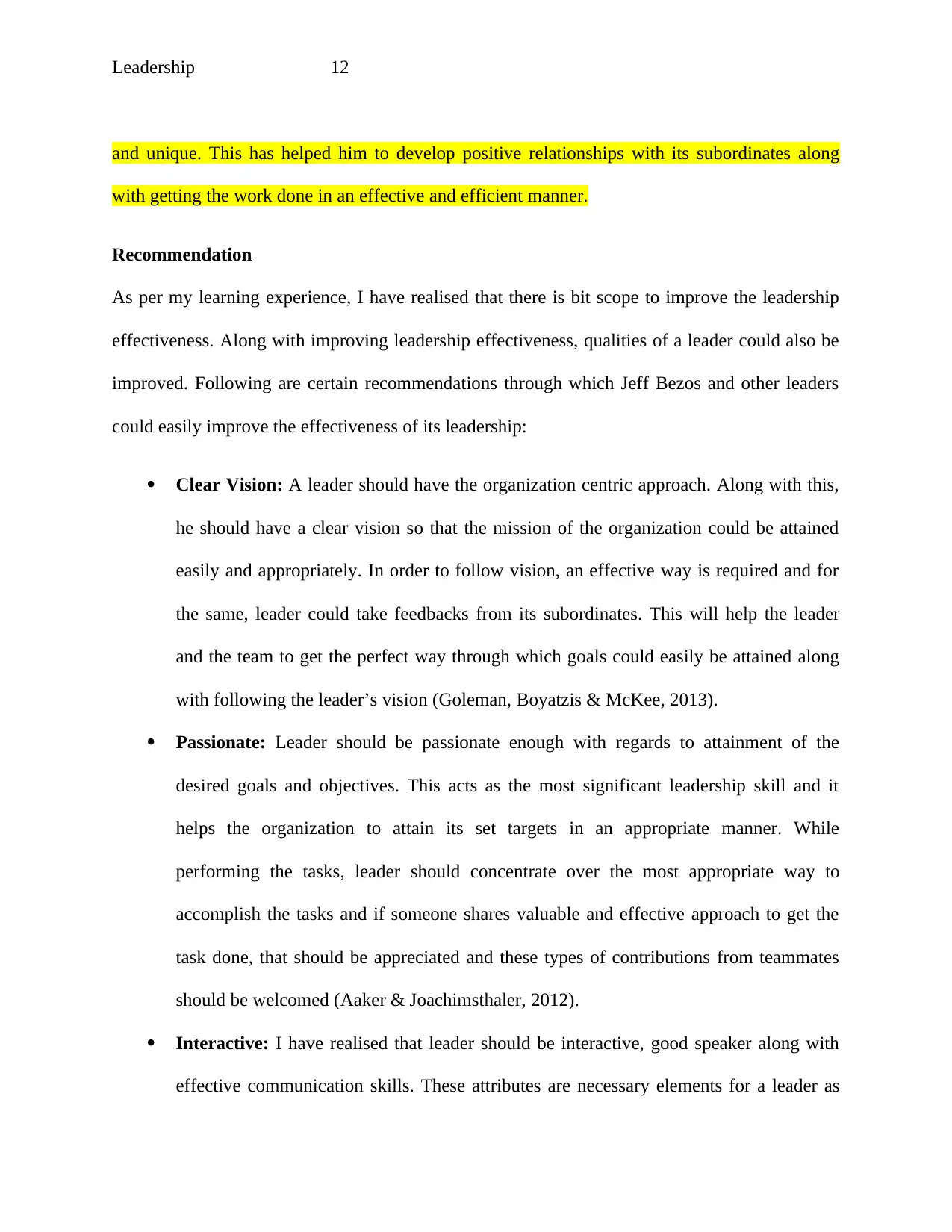
Leadership 12
and unique. This has helped him to develop positive relationships with its subordinates along
with getting the work done in an effective and efficient manner.
Recommendation
As per my learning experience, I have realised that there is bit scope to improve the leadership
effectiveness. Along with improving leadership effectiveness, qualities of a leader could also be
improved. Following are certain recommendations through which Jeff Bezos and other leaders
could easily improve the effectiveness of its leadership:
Clear Vision: A leader should have the organization centric approach. Along with this,
he should have a clear vision so that the mission of the organization could be attained
easily and appropriately. In order to follow vision, an effective way is required and for
the same, leader could take feedbacks from its subordinates. This will help the leader
and the team to get the perfect way through which goals could easily be attained along
with following the leader’s vision (Goleman, Boyatzis & McKee, 2013).
Passionate: Leader should be passionate enough with regards to attainment of the
desired goals and objectives. This acts as the most significant leadership skill and it
helps the organization to attain its set targets in an appropriate manner. While
performing the tasks, leader should concentrate over the most appropriate way to
accomplish the tasks and if someone shares valuable and effective approach to get the
task done, that should be appreciated and these types of contributions from teammates
should be welcomed (Aaker & Joachimsthaler, 2012).
Interactive: I have realised that leader should be interactive, good speaker along with
effective communication skills. These attributes are necessary elements for a leader as
and unique. This has helped him to develop positive relationships with its subordinates along
with getting the work done in an effective and efficient manner.
Recommendation
As per my learning experience, I have realised that there is bit scope to improve the leadership
effectiveness. Along with improving leadership effectiveness, qualities of a leader could also be
improved. Following are certain recommendations through which Jeff Bezos and other leaders
could easily improve the effectiveness of its leadership:
Clear Vision: A leader should have the organization centric approach. Along with this,
he should have a clear vision so that the mission of the organization could be attained
easily and appropriately. In order to follow vision, an effective way is required and for
the same, leader could take feedbacks from its subordinates. This will help the leader
and the team to get the perfect way through which goals could easily be attained along
with following the leader’s vision (Goleman, Boyatzis & McKee, 2013).
Passionate: Leader should be passionate enough with regards to attainment of the
desired goals and objectives. This acts as the most significant leadership skill and it
helps the organization to attain its set targets in an appropriate manner. While
performing the tasks, leader should concentrate over the most appropriate way to
accomplish the tasks and if someone shares valuable and effective approach to get the
task done, that should be appreciated and these types of contributions from teammates
should be welcomed (Aaker & Joachimsthaler, 2012).
Interactive: I have realised that leader should be interactive, good speaker along with
effective communication skills. These attributes are necessary elements for a leader as
Paraphrase This Document
Need a fresh take? Get an instant paraphrase of this document with our AI Paraphraser
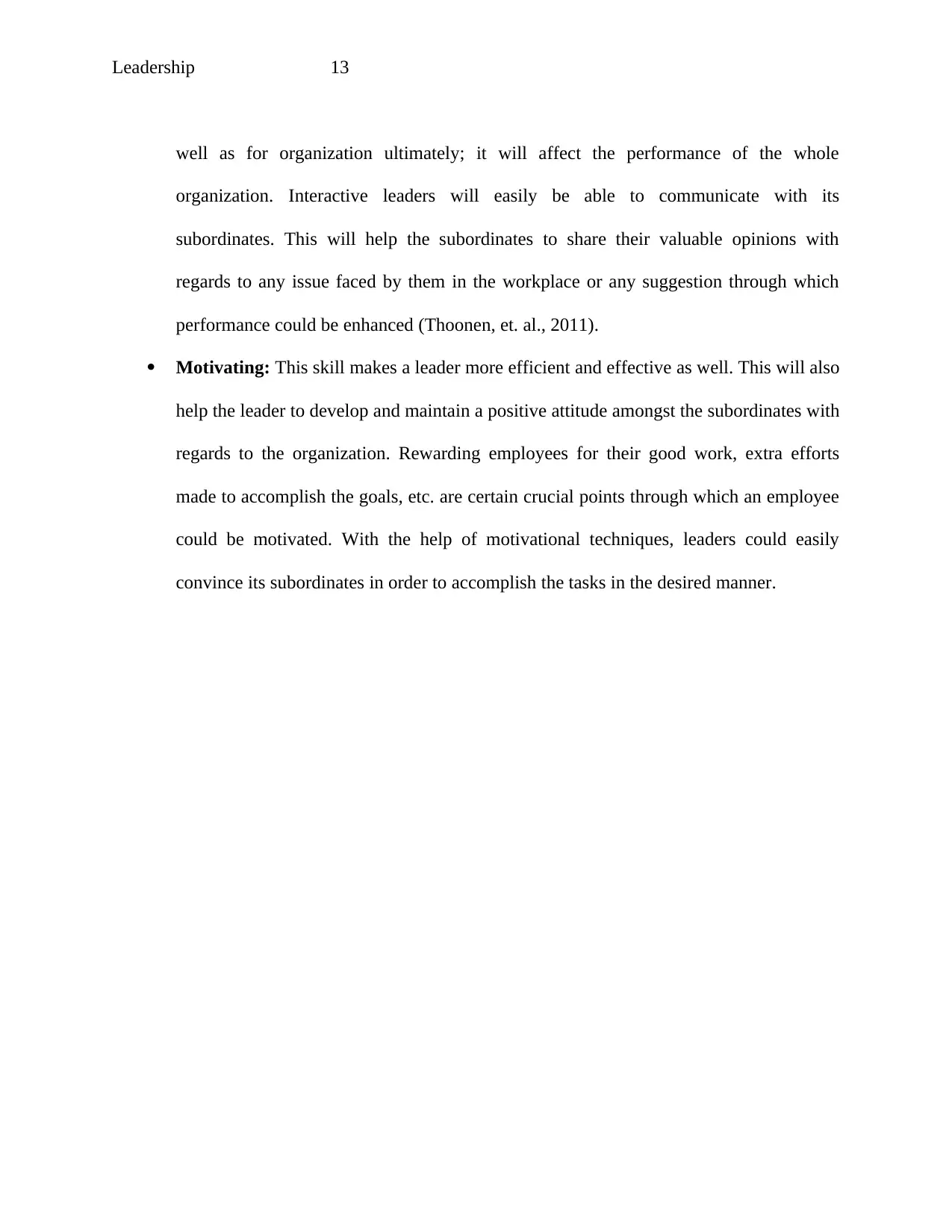
Leadership 13
well as for organization ultimately; it will affect the performance of the whole
organization. Interactive leaders will easily be able to communicate with its
subordinates. This will help the subordinates to share their valuable opinions with
regards to any issue faced by them in the workplace or any suggestion through which
performance could be enhanced (Thoonen, et. al., 2011).
Motivating: This skill makes a leader more efficient and effective as well. This will also
help the leader to develop and maintain a positive attitude amongst the subordinates with
regards to the organization. Rewarding employees for their good work, extra efforts
made to accomplish the goals, etc. are certain crucial points through which an employee
could be motivated. With the help of motivational techniques, leaders could easily
convince its subordinates in order to accomplish the tasks in the desired manner.
well as for organization ultimately; it will affect the performance of the whole
organization. Interactive leaders will easily be able to communicate with its
subordinates. This will help the subordinates to share their valuable opinions with
regards to any issue faced by them in the workplace or any suggestion through which
performance could be enhanced (Thoonen, et. al., 2011).
Motivating: This skill makes a leader more efficient and effective as well. This will also
help the leader to develop and maintain a positive attitude amongst the subordinates with
regards to the organization. Rewarding employees for their good work, extra efforts
made to accomplish the goals, etc. are certain crucial points through which an employee
could be motivated. With the help of motivational techniques, leaders could easily
convince its subordinates in order to accomplish the tasks in the desired manner.
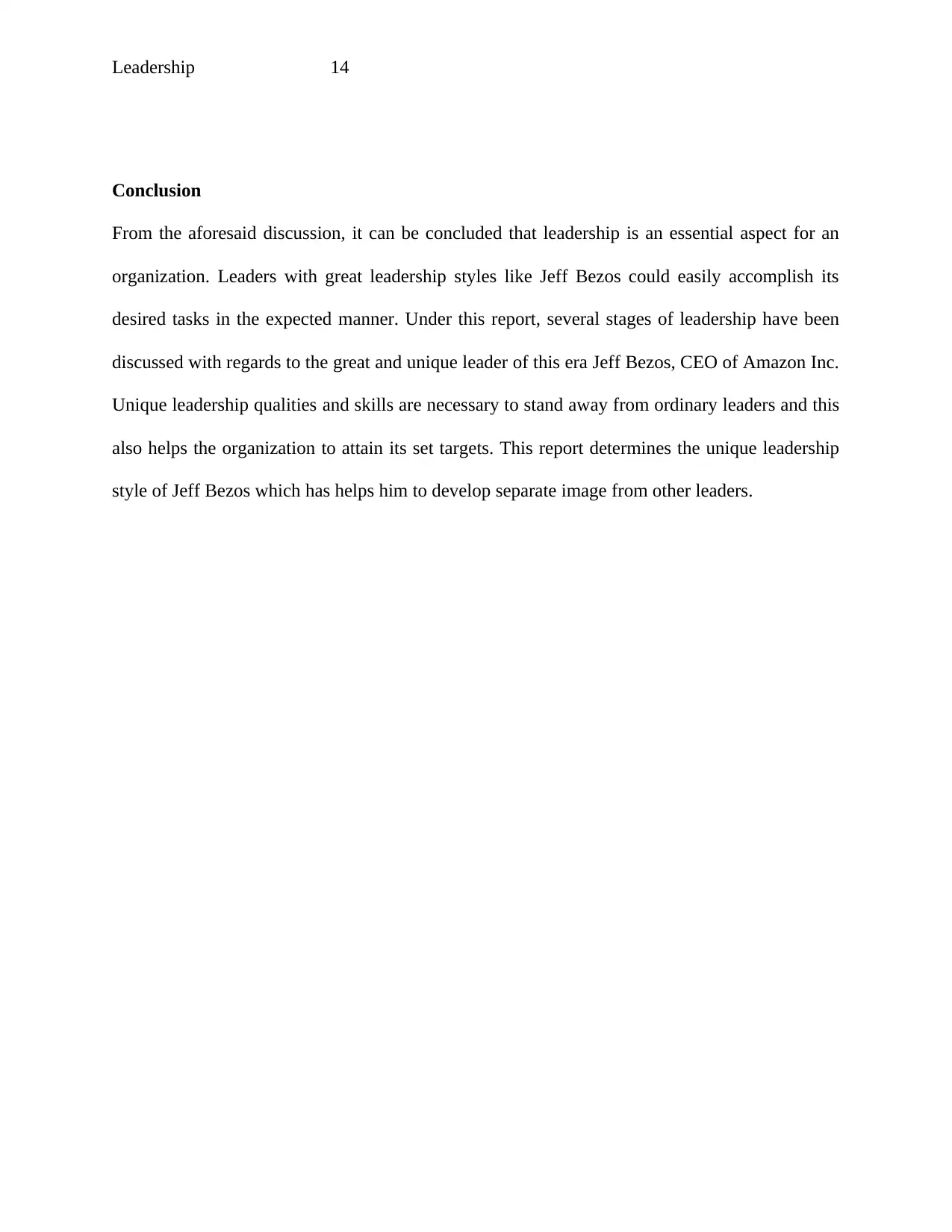
Leadership 14
Conclusion
From the aforesaid discussion, it can be concluded that leadership is an essential aspect for an
organization. Leaders with great leadership styles like Jeff Bezos could easily accomplish its
desired tasks in the expected manner. Under this report, several stages of leadership have been
discussed with regards to the great and unique leader of this era Jeff Bezos, CEO of Amazon Inc.
Unique leadership qualities and skills are necessary to stand away from ordinary leaders and this
also helps the organization to attain its set targets. This report determines the unique leadership
style of Jeff Bezos which has helps him to develop separate image from other leaders.
Conclusion
From the aforesaid discussion, it can be concluded that leadership is an essential aspect for an
organization. Leaders with great leadership styles like Jeff Bezos could easily accomplish its
desired tasks in the expected manner. Under this report, several stages of leadership have been
discussed with regards to the great and unique leader of this era Jeff Bezos, CEO of Amazon Inc.
Unique leadership qualities and skills are necessary to stand away from ordinary leaders and this
also helps the organization to attain its set targets. This report determines the unique leadership
style of Jeff Bezos which has helps him to develop separate image from other leaders.
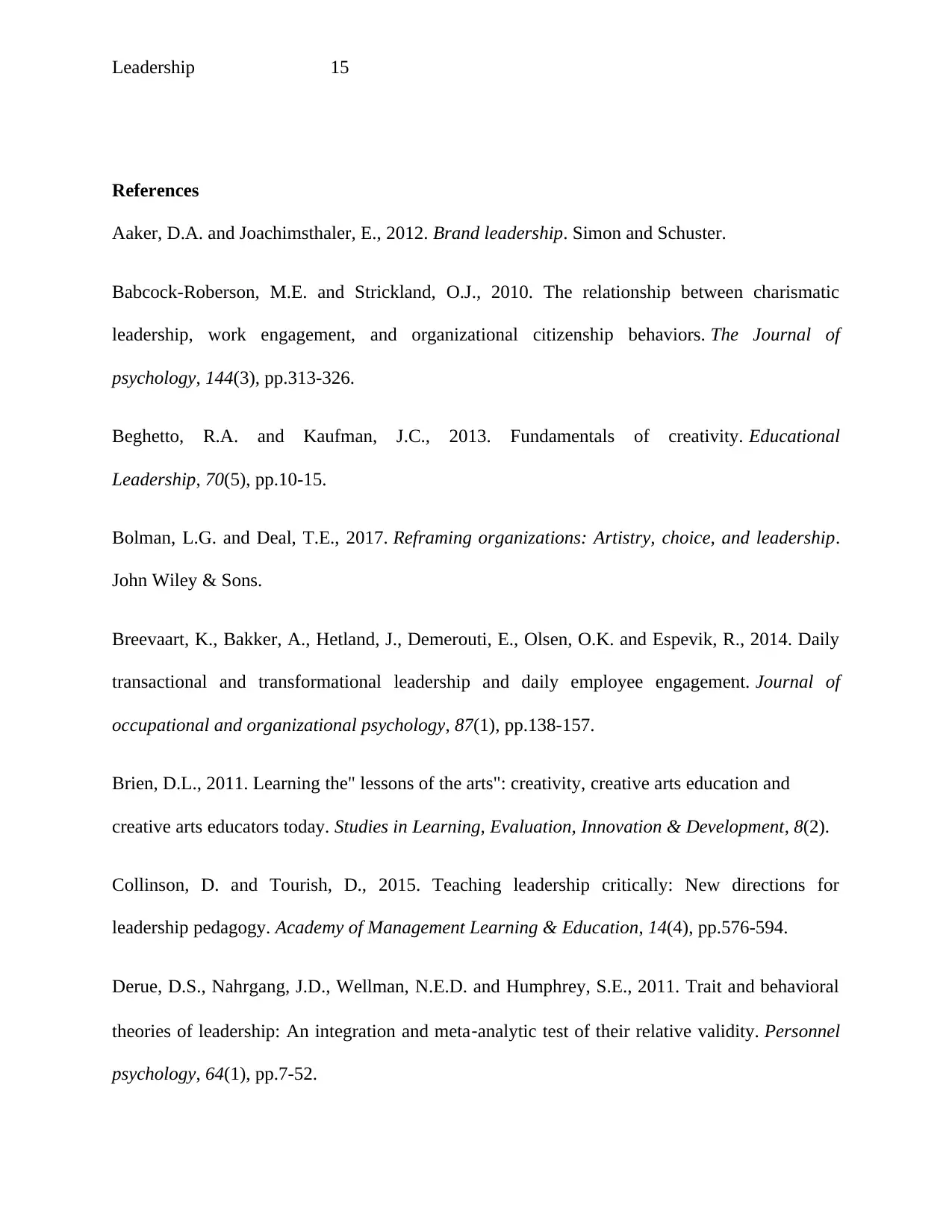
Leadership 15
References
Aaker, D.A. and Joachimsthaler, E., 2012. Brand leadership. Simon and Schuster.
Babcock-Roberson, M.E. and Strickland, O.J., 2010. The relationship between charismatic
leadership, work engagement, and organizational citizenship behaviors. The Journal of
psychology, 144(3), pp.313-326.
Beghetto, R.A. and Kaufman, J.C., 2013. Fundamentals of creativity. Educational
Leadership, 70(5), pp.10-15.
Bolman, L.G. and Deal, T.E., 2017. Reframing organizations: Artistry, choice, and leadership.
John Wiley & Sons.
Breevaart, K., Bakker, A., Hetland, J., Demerouti, E., Olsen, O.K. and Espevik, R., 2014. Daily
transactional and transformational leadership and daily employee engagement. Journal of
occupational and organizational psychology, 87(1), pp.138-157.
Brien, D.L., 2011. Learning the" lessons of the arts": creativity, creative arts education and
creative arts educators today. Studies in Learning, Evaluation, Innovation & Development, 8(2).
Collinson, D. and Tourish, D., 2015. Teaching leadership critically: New directions for
leadership pedagogy. Academy of Management Learning & Education, 14(4), pp.576-594.
Derue, D.S., Nahrgang, J.D., Wellman, N.E.D. and Humphrey, S.E., 2011. Trait and behavioral
theories of leadership: An integration and meta‐analytic test of their relative validity. Personnel
psychology, 64(1), pp.7-52.
References
Aaker, D.A. and Joachimsthaler, E., 2012. Brand leadership. Simon and Schuster.
Babcock-Roberson, M.E. and Strickland, O.J., 2010. The relationship between charismatic
leadership, work engagement, and organizational citizenship behaviors. The Journal of
psychology, 144(3), pp.313-326.
Beghetto, R.A. and Kaufman, J.C., 2013. Fundamentals of creativity. Educational
Leadership, 70(5), pp.10-15.
Bolman, L.G. and Deal, T.E., 2017. Reframing organizations: Artistry, choice, and leadership.
John Wiley & Sons.
Breevaart, K., Bakker, A., Hetland, J., Demerouti, E., Olsen, O.K. and Espevik, R., 2014. Daily
transactional and transformational leadership and daily employee engagement. Journal of
occupational and organizational psychology, 87(1), pp.138-157.
Brien, D.L., 2011. Learning the" lessons of the arts": creativity, creative arts education and
creative arts educators today. Studies in Learning, Evaluation, Innovation & Development, 8(2).
Collinson, D. and Tourish, D., 2015. Teaching leadership critically: New directions for
leadership pedagogy. Academy of Management Learning & Education, 14(4), pp.576-594.
Derue, D.S., Nahrgang, J.D., Wellman, N.E.D. and Humphrey, S.E., 2011. Trait and behavioral
theories of leadership: An integration and meta‐analytic test of their relative validity. Personnel
psychology, 64(1), pp.7-52.
Secure Best Marks with AI Grader
Need help grading? Try our AI Grader for instant feedback on your assignments.
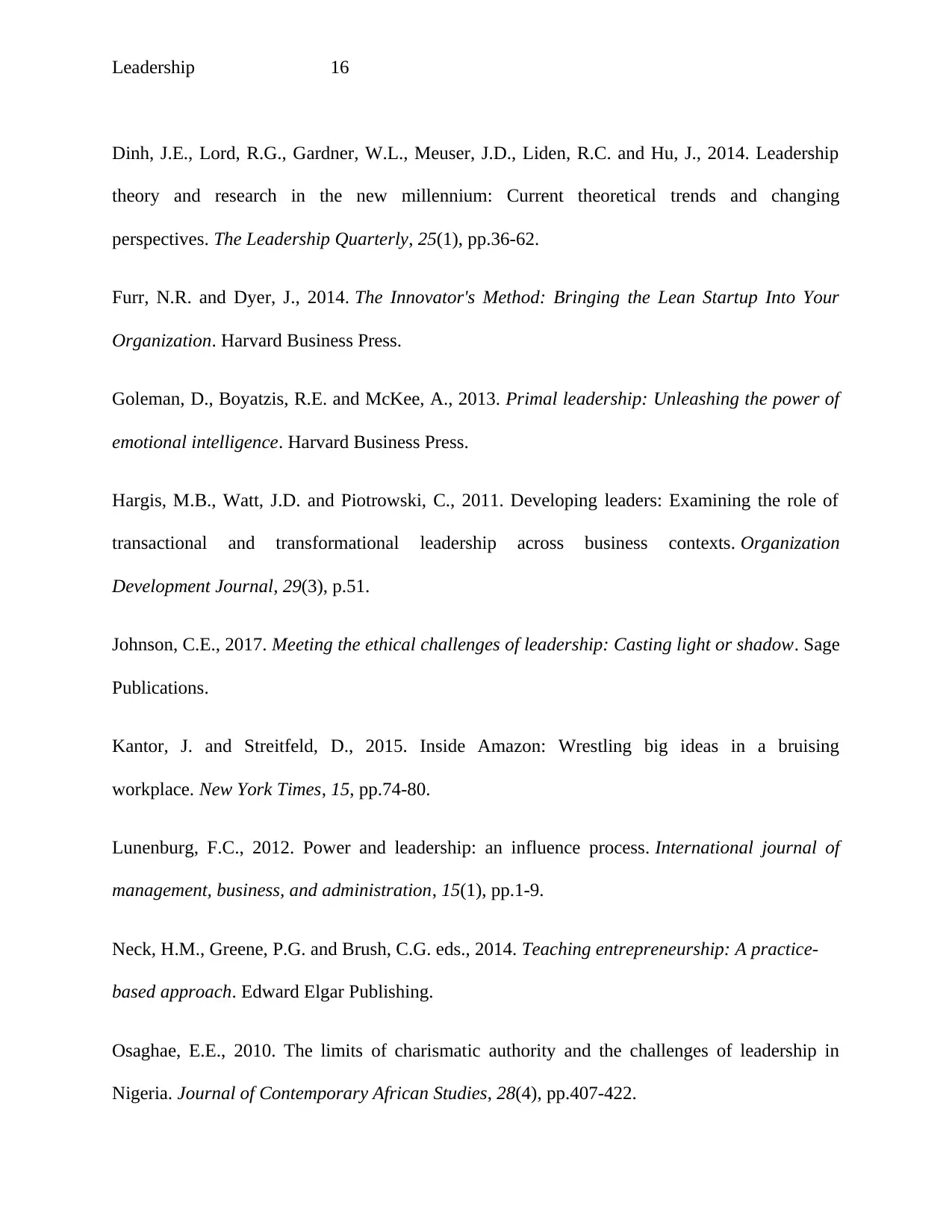
Leadership 16
Dinh, J.E., Lord, R.G., Gardner, W.L., Meuser, J.D., Liden, R.C. and Hu, J., 2014. Leadership
theory and research in the new millennium: Current theoretical trends and changing
perspectives. The Leadership Quarterly, 25(1), pp.36-62.
Furr, N.R. and Dyer, J., 2014. The Innovator's Method: Bringing the Lean Startup Into Your
Organization. Harvard Business Press.
Goleman, D., Boyatzis, R.E. and McKee, A., 2013. Primal leadership: Unleashing the power of
emotional intelligence. Harvard Business Press.
Hargis, M.B., Watt, J.D. and Piotrowski, C., 2011. Developing leaders: Examining the role of
transactional and transformational leadership across business contexts. Organization
Development Journal, 29(3), p.51.
Johnson, C.E., 2017. Meeting the ethical challenges of leadership: Casting light or shadow. Sage
Publications.
Kantor, J. and Streitfeld, D., 2015. Inside Amazon: Wrestling big ideas in a bruising
workplace. New York Times, 15, pp.74-80.
Lunenburg, F.C., 2012. Power and leadership: an influence process. International journal of
management, business, and administration, 15(1), pp.1-9.
Neck, H.M., Greene, P.G. and Brush, C.G. eds., 2014. Teaching entrepreneurship: A practice-
based approach. Edward Elgar Publishing.
Osaghae, E.E., 2010. The limits of charismatic authority and the challenges of leadership in
Nigeria. Journal of Contemporary African Studies, 28(4), pp.407-422.
Dinh, J.E., Lord, R.G., Gardner, W.L., Meuser, J.D., Liden, R.C. and Hu, J., 2014. Leadership
theory and research in the new millennium: Current theoretical trends and changing
perspectives. The Leadership Quarterly, 25(1), pp.36-62.
Furr, N.R. and Dyer, J., 2014. The Innovator's Method: Bringing the Lean Startup Into Your
Organization. Harvard Business Press.
Goleman, D., Boyatzis, R.E. and McKee, A., 2013. Primal leadership: Unleashing the power of
emotional intelligence. Harvard Business Press.
Hargis, M.B., Watt, J.D. and Piotrowski, C., 2011. Developing leaders: Examining the role of
transactional and transformational leadership across business contexts. Organization
Development Journal, 29(3), p.51.
Johnson, C.E., 2017. Meeting the ethical challenges of leadership: Casting light or shadow. Sage
Publications.
Kantor, J. and Streitfeld, D., 2015. Inside Amazon: Wrestling big ideas in a bruising
workplace. New York Times, 15, pp.74-80.
Lunenburg, F.C., 2012. Power and leadership: an influence process. International journal of
management, business, and administration, 15(1), pp.1-9.
Neck, H.M., Greene, P.G. and Brush, C.G. eds., 2014. Teaching entrepreneurship: A practice-
based approach. Edward Elgar Publishing.
Osaghae, E.E., 2010. The limits of charismatic authority and the challenges of leadership in
Nigeria. Journal of Contemporary African Studies, 28(4), pp.407-422.
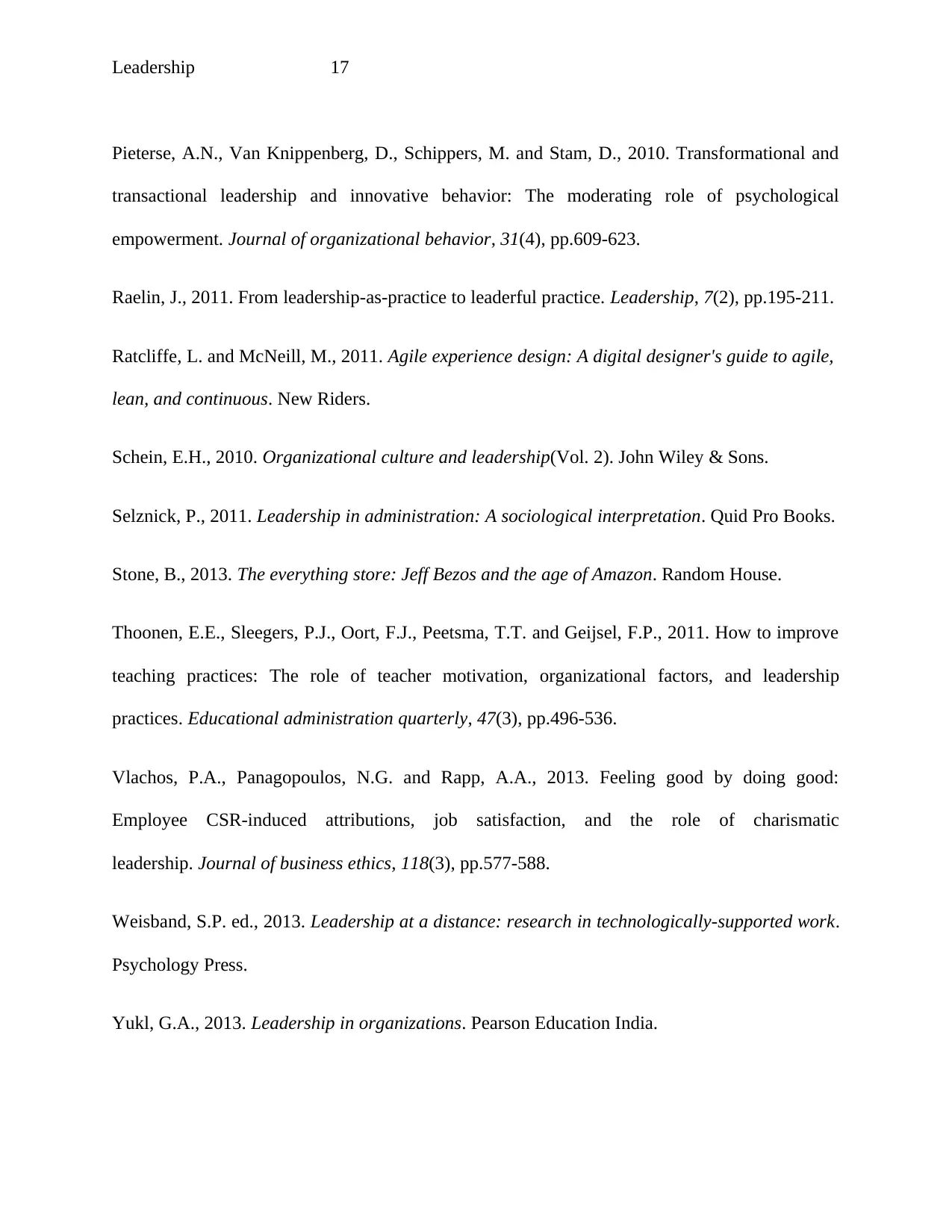
Leadership 17
Pieterse, A.N., Van Knippenberg, D., Schippers, M. and Stam, D., 2010. Transformational and
transactional leadership and innovative behavior: The moderating role of psychological
empowerment. Journal of organizational behavior, 31(4), pp.609-623.
Raelin, J., 2011. From leadership-as-practice to leaderful practice. Leadership, 7(2), pp.195-211.
Ratcliffe, L. and McNeill, M., 2011. Agile experience design: A digital designer's guide to agile,
lean, and continuous. New Riders.
Schein, E.H., 2010. Organizational culture and leadership(Vol. 2). John Wiley & Sons.
Selznick, P., 2011. Leadership in administration: A sociological interpretation. Quid Pro Books.
Stone, B., 2013. The everything store: Jeff Bezos and the age of Amazon. Random House.
Thoonen, E.E., Sleegers, P.J., Oort, F.J., Peetsma, T.T. and Geijsel, F.P., 2011. How to improve
teaching practices: The role of teacher motivation, organizational factors, and leadership
practices. Educational administration quarterly, 47(3), pp.496-536.
Vlachos, P.A., Panagopoulos, N.G. and Rapp, A.A., 2013. Feeling good by doing good:
Employee CSR-induced attributions, job satisfaction, and the role of charismatic
leadership. Journal of business ethics, 118(3), pp.577-588.
Weisband, S.P. ed., 2013. Leadership at a distance: research in technologically-supported work.
Psychology Press.
Yukl, G.A., 2013. Leadership in organizations. Pearson Education India.
Pieterse, A.N., Van Knippenberg, D., Schippers, M. and Stam, D., 2010. Transformational and
transactional leadership and innovative behavior: The moderating role of psychological
empowerment. Journal of organizational behavior, 31(4), pp.609-623.
Raelin, J., 2011. From leadership-as-practice to leaderful practice. Leadership, 7(2), pp.195-211.
Ratcliffe, L. and McNeill, M., 2011. Agile experience design: A digital designer's guide to agile,
lean, and continuous. New Riders.
Schein, E.H., 2010. Organizational culture and leadership(Vol. 2). John Wiley & Sons.
Selznick, P., 2011. Leadership in administration: A sociological interpretation. Quid Pro Books.
Stone, B., 2013. The everything store: Jeff Bezos and the age of Amazon. Random House.
Thoonen, E.E., Sleegers, P.J., Oort, F.J., Peetsma, T.T. and Geijsel, F.P., 2011. How to improve
teaching practices: The role of teacher motivation, organizational factors, and leadership
practices. Educational administration quarterly, 47(3), pp.496-536.
Vlachos, P.A., Panagopoulos, N.G. and Rapp, A.A., 2013. Feeling good by doing good:
Employee CSR-induced attributions, job satisfaction, and the role of charismatic
leadership. Journal of business ethics, 118(3), pp.577-588.
Weisband, S.P. ed., 2013. Leadership at a distance: research in technologically-supported work.
Psychology Press.
Yukl, G.A., 2013. Leadership in organizations. Pearson Education India.
1 out of 18
Related Documents
Your All-in-One AI-Powered Toolkit for Academic Success.
+13062052269
info@desklib.com
Available 24*7 on WhatsApp / Email
![[object Object]](/_next/static/media/star-bottom.7253800d.svg)
Unlock your academic potential
© 2024 | Zucol Services PVT LTD | All rights reserved.



